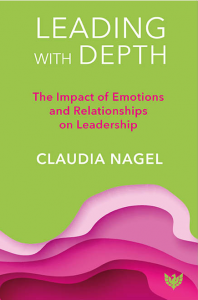 Prof Dr Claudia Nagel is an author, executive coach, and senior advisor to international organisations and their board members. She is full Professor at the VU Amsterdam University, holding a chair on change and identity. In her early career, she held leadership positions in finance/investment banking and management consulting. As an economist (MBA), organisational psychologist (PhD), and chartered psychoanalyst (ISAP), Claudia is an expert on strategic management, leadership, and change processes. She runs her own consulting business, Nagel & Company, and is past president of the International Society for the Psychoanalytic Study of Organizations (ISPSO). She publishes extensively on the psycho- and sociodynamics of strategic management, leadership, and change and recently wrote ‘Psychodynamic Coaching’ (Routledge, 2020) and ‘Leading With Depth: How Emotions and Relationships Influence Leadership’ (Phoenix, 2024).
Prof Dr Claudia Nagel is an author, executive coach, and senior advisor to international organisations and their board members. She is full Professor at the VU Amsterdam University, holding a chair on change and identity. In her early career, she held leadership positions in finance/investment banking and management consulting. As an economist (MBA), organisational psychologist (PhD), and chartered psychoanalyst (ISAP), Claudia is an expert on strategic management, leadership, and change processes. She runs her own consulting business, Nagel & Company, and is past president of the International Society for the Psychoanalytic Study of Organizations (ISPSO). She publishes extensively on the psycho- and sociodynamics of strategic management, leadership, and change and recently wrote ‘Psychodynamic Coaching’ (Routledge, 2020) and ‘Leading With Depth: How Emotions and Relationships Influence Leadership’ (Phoenix, 2024).
Claudia’s latest book Leading with Depth: The Impact of Emotions and Relationships on Leadership guides us through the emotional and relational fallacies of organisational leadership while offering practical routes out of them.
This book delves deeply into understanding how emotions and relationships play a pivotal role in shaping leaders and their leadership styles. Leaders at the helm of organisations are indeed at the forefront of societal shifts. The way they lead does not merely influence their immediate team, but it resonates further, touching stakeholders and even extending beyond.
In today’s world, with artificial intelligence becoming increasingly pervasive, we need to lean into our specific human intelligence. In short this is about having and dealing with emotions, being sociable and having a felt body and applying morality to decisions. Sophisticated generative language models converse with us as if they were human, but, despite their allure, they are not. They are only prediction machines lining up words and ideas already existent in their database. As of now, the profound complexity of our internal emotional world and the intricacies of the human brain remain unparalleled, and it still seems to be happening, if at all, in a rather distant future. If we want to play a significant role in the future supported by intelligent machines (whatever this exactly means – to be intelligent as a machine) and if we want them to support us instead of us becoming like them, we need to concentrate on what makes us human and humane. We need to set a counterweight to not getting overruled by comforting machines appealing to our laziness.
In my work with executives, I have realized how much they yearn to understand their inner world yet how afraid they are of it as well. A few even operate under the presumption that emotions don’t intertwine with their professional sphere – until the moment they understand how their own emotional set up underpins their decisions and thus the organisations they lead. The same accounts for relating with other people. Organisations are networks, living systems consisting themselves of human beings as living systems. How can we overlook the importance of our mutual interactions within such a multifaceted living system?
My take is that people, especially leaders who are intellectually demanding, will benefit and have an easier way into their own inner world, when they grasp how this world works, how their personal set up was created and shaped, and how much it influences them to this day. It will make them more capable of having a realistic view onto the world for taking better decisions, less influenced by the black box of their often unconscious emotions. By truly knowing themselves, when their self-awareness is well developed, they will be able to be empathic leaders supporting their people to flourish, thereby enhancing organisational performance.
In my book I give a comprehensive overview of the myriad ways our emotions engage with us and how we can apply that knowledge to working with teams and systems. In the first part, I explore the leader as an individual, whereas the second part takes the organisational and thus systemic context of leadership into account. Each part develops from a theoretical perspective to more practical and method-oriented chapters. The first chapter of each part is purely theoretical, whereas the following chapters are complemented by case studies, written by dear colleagues and well-known experts (coaches, consultants, and academics) and, referring to their own experience, applying some of the phenomenon explained in the respective chapter. Each chapter concludes with a brief overview of the key learnings.
It is written for incoming and experienced leaders who want to learn more about their own inner emotional life while being in a leading role. It will help you to explore and deepen your self-awareness and your personal way of executing leadership.
Claudia Nagel
Leading with Depth: The Impact of Emotions and Relationships on Leadership is available from our website now.

